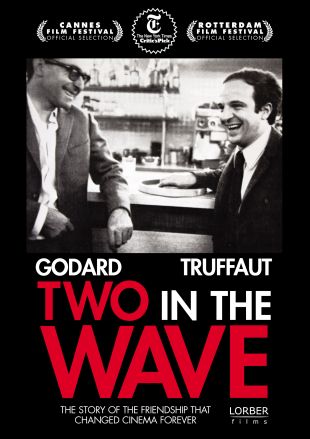There are few names in the history of cinema that provoke reactions as strongly as François Truffaut and Jean-Luc Godard. In less than ten years, these two movie-obsessed Frenchmen not only changed the course of French cinema, but redefined what a film could be for audiences throughout the world. Two in the Wave, a fascinating and surprisingly touching documentary, charts the beginning of their friendship, the rise of the French New Wave, and the radical split that led to the permanent severing of their once very deep artistic bond.
Director Emmanuel Laurent seamlessly combines a vast amount of archival footage in order to tell his story. He cuts between still photos, film clips, and old interviews with an abandon that would make the Truffaut and Godard of 1960 proud. Laurent's judicious use of narration and old audio, coupled with the images, gets the viewer to feel the heady rush of the French film scene in the '50s, when "The Young Turks" (Truffaut, Godard, Rivette, Chabrol, and Rohmer) redefined film criticism in the magazine Cahiers du Cinema. There is such passion, such intellectual vigor, such youthful displays of arrogance and polemic intensity in their arguments that it seems inevitable when the two most striking of them -- Truffaut and Godard -- actually do achieve their goals of shattering the stale traditions of cinema with their debut features, The 400 Blows and Breathless.
As the two men fought censorship and declining box office throughout the '60s, they could always count on each other. Publicly, their support never wavered, and they would often lend a hand writing or producing for each other. But in 1968, the men stood together for what would turn out to be the final time. Spurred by the workers and student strikes in Paris, they managed to shut down the 1968 Cannes Film Festival, where less than a decade before Truffaut had become the toast of the world with The 400 Blows. The events of '68 would radicalize Godard, changing his style and his vision for what cinema should be, and in a few short years their decades-long collaboration ended in bitter insults exchanged not just in letters to each other, but in their movies as well.
Two in the Wave achieves so much that afterward it's hard to believe it's just 93 minutes long. First of all, this is a wonderful piece of film history. For those just discovering the French New Wave, the movie offers a quick, but fairly detailed explanation of the forces that brought these artists together, and explains how the movement fell apart, even though its influences can still be felt 50 years later.
Just as impressively, Laurent makes us feel his subjects' passions. Their heart and soul is in every frame they shot and every word they wrote, and the film quotes them so readily that you get swept up in their messianic zeal. Listening to Godard explain the serious intent behind his films is a far cry from listening to a superstar actor plug his latest billion-dollar blockbuster on a late-night chat show. If you aren't already a film obsessive, Two in the Wave might make you one.
But the film's greatest coup is in its final act when, after the two men have forever ended their friendship, we see the toll it took on Jean-Pierre Léaud, the actor who starred as Antoine Doinel in a series of autobiographical films for Truffaut, and also worked regularly for Godard. Léaud's loyalties are torn, like the child of feuding divorcing parents, and in these closing passages Laurent makes their very public breakup incredibly personal and poignant.
The movie ends with footage of the young Léaud, in what looks to be audition footage for The 400 Blows, and it's amazing to look at the kid and know that he was about to spend years in the center of an amazing period of filmmaking. And that he would soon discover that art sometimes makes it impossible to remain friends. See Two in the Wave if you want to learn about movie history, see it if you want to know more about the French New Wave, and see it because it's a moving portrait of a shattered friendship.
